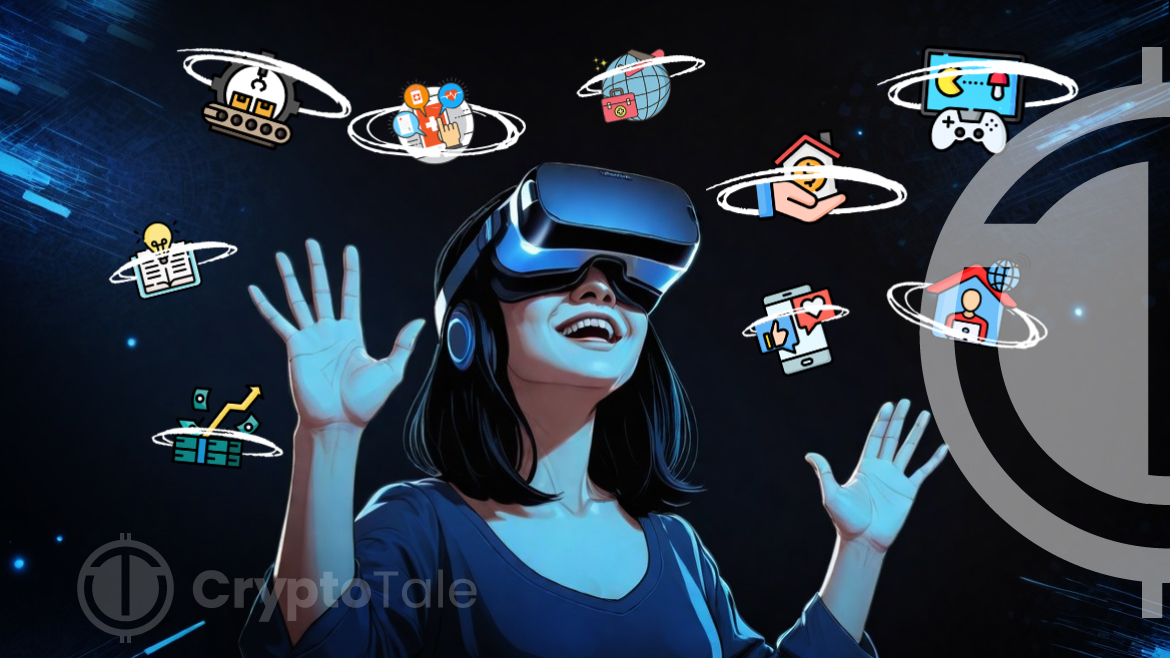Metaverse is a boundless realm where virtual reality intertwines with the real world. Due to its attributes like decentralization, virtual economy, virtual reality, and more, the metaverse has attracted the attention of many leading players in the tech world. Metaverse is a whole new realm with endless possibilities in a virtual space.
What is Metaverse Technology?
Metaverse is a three-dimensional digital space constructed by AR (Augmented Reality) and VR (Virtual Reality). It is a digital world where users can interact with each other and perform various activities using avatars. Metaverse consists of in-game collectibles, NFTs, and more. It is an interconnected space supported by some of the cutting-edge technologies, like blockchain, AI, computer vision, virtual reality, and more.
In the metaverse, users can shop, visit theme parks, get employment, and more.
Driven by the popularity of VR and AR technologies, the metaverse is experiencing rapid growth. As per stats, in 2024, over 600 million users worldwide have entered the metaverse. By the end of this year, it is expected to reach a market size of $74.4 billion.
What Are The Advantages Of Metaverse?
Metaverse will bring the digital experience to a whole new level, allowing users to immerse in the virtual 3D world. There are a lot of advantages to metaverse, and some of them are:
Healthcare Benefits:
Metaverse aids healthcare specialists in providing timely assistance for patients in need. In the virtual environment, medical professionals can interact with patients, diagnose their health conditions, and provide a cure.
Gaming More Exciting:
Different from the current games, metaverse games offer gamers an immersive experience. A distinctive feature of metaverse games is the widespread adoption of the play-to-earn model. This model allows gamers to buy, sell, and trade in-game items represented as NFTs with crypto as payment. In addition, gamers have more freedom to explore the vast virtual space.
Effective Remote Working:
Metaverse facilitates employees working remotely to collaborate in a virtual space. It offers a range of environments that can be customized according to personal preferences and enables coworkers to collaborate in real-time or asynchronously.
Virtual Tour Experience:
Individuals can experience touring worldwide from the comfort of their home with metaverse. Furthermore, they can travel back to the past and have an immersive experience of the Wild West, Warring Periods, and other historical periods.
What Are The Use Cases Of Metaverse?
1. Entertainment:
Metaverse offers a profound immersive experience, encompassing TV series, movies, concerts, sporting events, etc. Fans can log into their virtual avatar and attend their favorite music concert or sporting matches in the virtual realm. In addition, the venue’s scalability ensures ample accommodation for all users, allowing unparalleled experiences in the comfort of their homes.
2. Gaming:
The gaming industry has significantly contributed to the rapid development of the metaverse. Gaming companies are investing heavily in research and development to create metaverse games. These games aim to provide gamers with realistic and immersive experiences that are beyond current technological capabilities.
Play-to-earn games will become the future of gaming, as players can earn money while having an immersive gaming experience. Players can buy, sell, and trade in-game NFT collectibles with other players or through the NFT marketplace.
3. Tourism:
With the help of VR headsets, users can experience a 360° virtual tour of their desired locations. Furthermore, through digital avatars, users can engage in realistic navigation and interact within the virtual world.
4. Education & Learning:
Metaverse has shown immense potential in providing an ideal environment for education and learning. It promotes the concept of remote learning by connecting students and teaching professionals through virtual classrooms.
Through the metaverse, students can watch live experiments. For instance, medical students can practice operating in a virtual and realistic environment.
5. Real Estate:
Virtual land is one of the main components of the metaverse. Individuals can buy, sell, or rent a virtual property. You can also go on a virtual property tour and make renovations to see how it looks without even making a purchase. Furthermore, digital real estate can be used to host events, conduct business, interact with others on the metaverse, and more.
6. Remote Working:
Many companies are still adopting remote working. While remote work has many advantages, it has many drawbacks. The biggest challenge is staying connected with your team and maintaining the same productivity level as in the office.
But metaverse solves this problem easily; it facilitates the creation of a virtual office space where your team can communicate in real-time, engage in team-building activities, and more.
7. Healthcare:
The development of the metaverse will transform the healthcare industry. Through metaverse, communication and collaboration between various professionals will become much easier. Furthermore, digital therapy allows patients to immerse themselves in a preferred digital environment for relaxation and stress relief.
8. Banking and Finance:
Banks have stepped into the realm of the virtual world and have started to offer loans. Metaverse represents an opportunity for banks to improve customer service, streamline processes, cut expenses, and more. Within the virtual bank, customers can apply for loans, manage finances, open accounts, and engage in other financial activities. Furthermore, clients can also apply for crypto loans.
9. Social Media:
Social Media platforms are transforming with the rise of the metaverse. These platforms are evolving from a two-dimensional ecosystem into a metaverse ecosystem. Unlike the existing platform, metaverse gives users an immersive experience, fostering a sense of in-person communication. Social media giants like Facebook are expanding into the metaverse and are introducing new features to elevate user engagement in the virtual realm.
10. Manufacturing & Heavy Industry:
The industrial sector will benefit significantly from the integration of the metaverse. By utilizing metaverse, companies can build virtual factories and use them to validate the product pipeline. This allows them to implement real-time modifications to any issues. Additionally, metaverse proves helpful for new hires, enabling them to learn how the assembly line works without being physically present. Furthermore, companies can build various virtual storefronts and allow customers to get to know the product and use the product before making a purchase. This would be helpful for companies in expanding their sale of products and services.
Conclusion:
The arrival of the metaverse has provoked a sense of excitement and has brought a plethora of investment opportunities for businesses. Still, the industry is in its infant stage, which needs user adoption and awareness. For this 21st century, it’s one of the revolutionary technologies that has the potential to reshape the business landscape.












